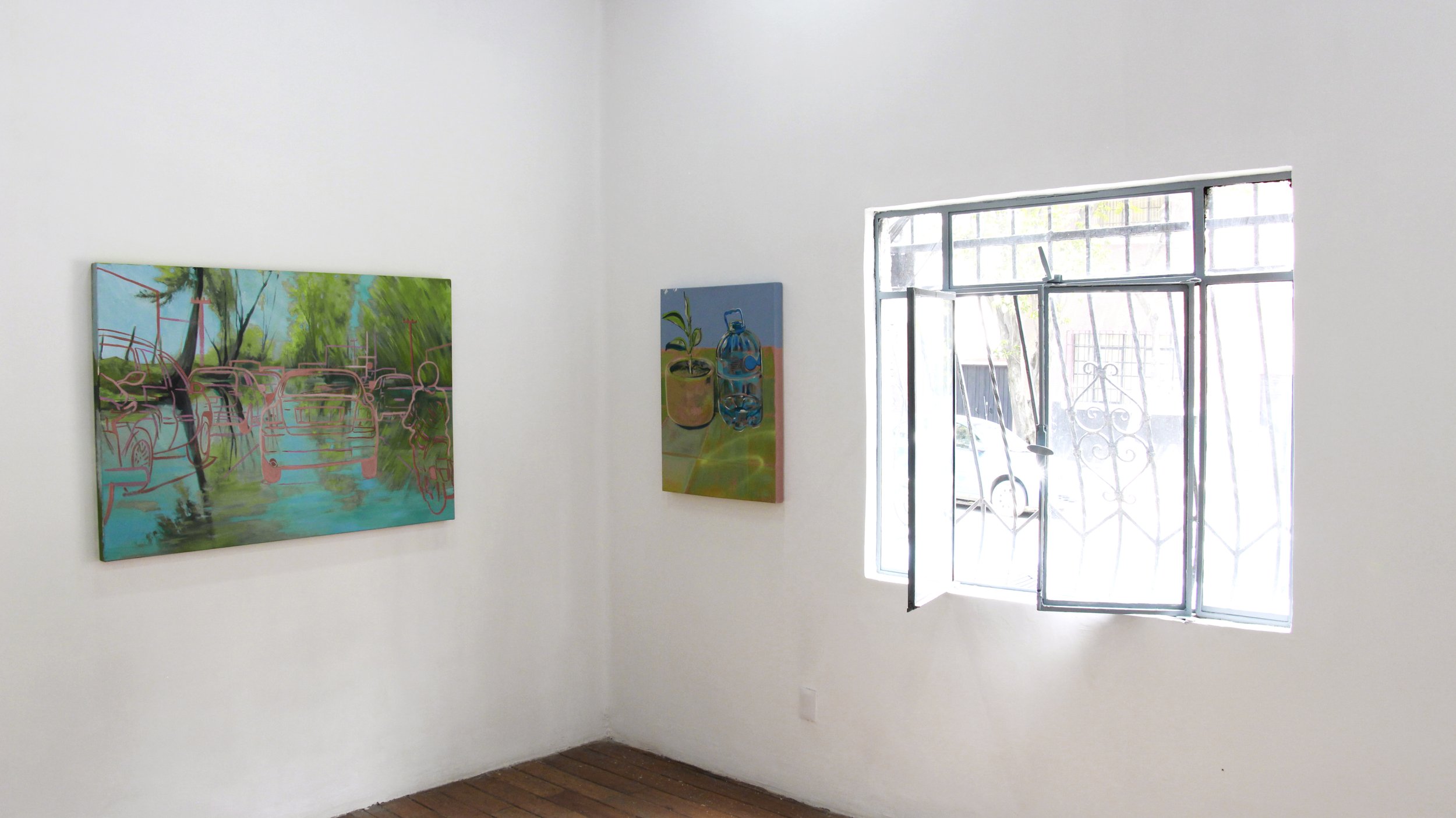Extremadamente superficial,
Increíblemente doloroso
de Santiago Mora
Mayo 27, 2023
En Extremadamente superficial, increíblemente doloroso, Santiago Mora presenta una observación de lo cotidiano y los momentos que pasan desapercibidos porque la rutina o el capitalismo los ha vuelto invisibles¹. Las obras consisten en bodegones construidos con objetos domésticos, vasos, botellas, flores y electrónicos de diferentes orígenes pero con un mismo destino: el basurero. A partir de la segunda mitad del Siglo XX, los polímeros se hicieron fundamentales en nuestra vida, sus aplicaciones no tienen limites y su uso y consumo es irremediable en prácticamente toda actividad humana. Su huella es innegable, los micro-residuos plásticos se encuentran en muchas especies animales (incluyendo al humano), y su durabilidad hace imposible su degradación en el ambiente.
Mora reflexiona sobre este consumo desde lo sensible, su obra no es una critica ecológica sino metafísica. Para el artista, los objetos destinados a utilizarse una sola vez, se vuelven la alegoría perfecta de nuestra socialización, donde el consumo constante y único se traslada a otros seres humanos. Pareciera que los peores hábitos de consumo se replican en cómo nos relacionamos les unes con les otres.
Santiago indaga en la relación que tenemos con la satisfacción momentánea y fugaz, moneda de cambio para una vida aparentemente cómoda pero hundida en el desasosiego, la impertinencia de nuestras interacciones y el uso y abuso del que somos cómplices contra nosotres mismes. Las obras, hechas con pintura acrílica sobre superficies plásticas, muestran escenas mundanas, siempre con la presencia humanizada de un algo: una botella de agua con rostro, o la silla de jardín, que es un “personaje” recurrente en la obra de Mora, objeto que para el artista representa al individuo y su existir, desgaste y resistencia ante las inclemencias del allá afuera.
La obra de Santiago reimagina estos momentos íntimos; más que lamentar el estar sumidos en el capitalismo y su dinámica de consumo desmedido (de recursos y de personas), construye un espacio para la melancolía, una potencial resiliencia y la transformación de nuestro andar por el mundo.
Laos Salazar
¹ Sylviere Lotringer en conversación con Chris Kraus: “…Olvidamos que el capitalismo existe, se ha vuelto invisible porque no hay nada más que mirar.”
ENG:
Extremely Superficial, Incredibly Painful is Santiago Mora’s observation of everyday life and the moments that go unnoticed because we are stuck on our routine or because capitalism has made them invisible¹. Still lifes built with domestic objects, glasses, bottles, flowers and electronic devices from different origins but with the same destination: the garbage dump. From the second half of the 20th century, polymers have become fundamental to our lives. Their applications have no limits and their use and consumption is irremediable in all human activity. Its footprint is undeniable: plastic micro-waste has been found in many animal species (including humans), its durability making it impossible for it to degrade in the environment.
Mora reflects on this consumption from the senses, his work is not an ecological critique but a metaphysical inquiry. For the artist, single-use objects become the perfect allegory of our socialization, where constant and unique consumption is transferred to other human beings. It seems that the worst consumer habits are replicated in how we relate to each other.
Santiago inquiries into the relationships we have with momentary and fleeting satisfaction, a bargaining chip for an apparently comfortable life that is sunk in restlessness. The impertinence of our interactions and abuse, of which we are complicit against ourselves. The paintings, made with acrylic paint on plastic surface, show mundane scenes, always with the humanized presence of something: a bottle of water with a face, or the garden chair, which is a recurring "character" in Mora's work, an object that represents the individual and his existence, wear and tear, and resistance to outside elements.
Santiago's work reimagines these intimate moments; More than lamenting being submerged in capitalism and its excessive consumption dynamics (of resources and people), it builds a space for melancholy, a potential resilience and the transformation of our journey through the world.
Laos Salazar.
¹ Sylviere Lotringer in conversation with Chris Kraus: “…We forgot that capitalism even exists. it has become invisible because there's nothing else to see.”







